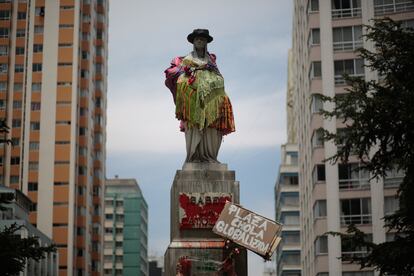Race Day? Decolonization Day? Latin America has many names, and questions, for October 12
Over the last 30 years this date has become a topic of dispute between those who still defend the traditional view of discovery by Christopher Columbus and a growing number who reject it


In many countries in the Americas and in Spain, October 12, 1492 has long been commemorated, celebrated, and more recently, criticized. Controversy surrounds everything, from the name given to the day itself to the events and activities held to observe it. Known variously as Race Day, Day of Hispanic Heritage, of the Indigenous Resistance, of the Discovery of America, of Respect for Cultural Diversity, of Decolonization, of Liberation, of Interculturality, of the Meeting of Two Worlds, as Pan-American Day and as National Day, October 12 marks the moment when Christopher Columbus landed on the island of Guanahaní (later renamed San Salvador) when he glimpsed the Antilles.
The explorer from Genoa wanted to find another trade route to India that would bring better profits and territorial expansion. With 100 men and funded by Queen Isabel of Castile, in modern-day Spain, three ships set out on an unexplored course that caused them to arrive, by chance, in the Americas.
In an interview with EL PAÍS, the historian Federico Navarrete emphasizes the uselessness of this story that has been taught for years in Mexican schools, where children learned by heart the names of the three ships commanded by Columbus; the Niña, the Pinta and the Santa María.
“The teaching of this day in public education in Mexico is based on picturesque anecdotes,” says Navarrete. “I remember that as a child they made me learn the name of the three caravels. It is picturesque, but it is completely useless because Columbus did not even know that he had arrived in America, he died convinced that he was in Asia.”
This is reinforced by the studies of Sofía Reding Blase, a researcher at the Research Center on Latin America and the Caribbean (CIALC) of the National Autonomous University of Mexico: “Although Columbus arrived in the Caribbean on his first voyage and only on the last one did he reach the shore of the mainland, he never realized it or at least he never admitted to having reached territories that were not Asian.”
The story of Columbus’s discovery should also include the darker side of his personality, the voyage, and his companions. Navarrete notes, for example, that with him also came many Arabs and Jews whose existence has been erased from historical records. He also underscores that Columbus’ zeal was not only aimed at reaching the Indies but also capturing the natives. “They should tell us about all the slaves that Columbus captured from the first day he was in America. On the same October 12 that he landed on the island of Guanahaní, he himself tells us that he took an indigenous slave and took him against his will on his ship. In addition to learning about the boat, we should learn about the people who were enslaved on that boat,” he adds.
Celebrations and commemorations of this day have been observed for centuries. On the 400th anniversary, it was celebrated in unison in Spain and the Americas. A replica of the Santa María was shipped from the southern Spanish city of Huelva. Mexico and Argentina created a monument and a canvas respectively to celebrate the date. Colombia did the same with a statue of Columbus.
Later, in 1928, José Vasconcelos institutionalized October 12 in Mexico with the idea of showing the cultural syncretism that had been achieved from the meeting of the two continents. It also sought to highlight nationalist values and create pride centered on a mixed race heritage.
For years, resources were allocated to commemorate a European-centric vision of the event throughout the American continent and ceremonies were held to celebrate the union, but the Americas’ past and the conflict over resources and territory that marked Europeans’ arrival remained invisible.
The “discovery” began to be questioned a century later. In 1992, during the event’s 500th anniversary, questions were asked out loud and the concept began to fall apart. Miguel León Portilla writes: “Why is it said that Columbus discovered America? Hadn’t the indigenous people themselves discovered it long before and, over millennia, populated it and created cultures such as the Teotihuacan, the Mayan, the Mexica, the Inca? How is it possible to talk about discovery if Columbus was never aware of what the lands he arrived at were?”
The Westernization of America is no longer a matter of pride and instead researchers now talk about the genocide and invasion of American territory. Christianity has begun to be seen as an imposition in the face of the destruction of local beliefs.
Navarrete adds that “Latin American societies, especially indigenous peoples, openly questioned that vision of October 12 as a date to be celebrated, as a discovery, as a great triumph, and rather highlighted a more negative vision of October 12 that emphasized the idea of 500 years of colonial oppression, of genocide, of persecution of indigenous cultures. Clearly, what they are criticizing is not only what this Italian who came to America did, but the fact that from then on, national regimes were established that have been intolerant, racist, violent and colonialist.”
Questioned about what narrative should be built around this day, the historian assures that there are many more reasons to protest than there are reasons to continue maintaining a vision of history that is racist, that privileges whites and subordinates indigenous people. Navarrete says this narrative only benefits Spain, which claims to be the heir of those discoverers, and the white elites of Latin American countries who continue to believe themselves superior to the rest of the population.
“I think that many people in Latin America (and me in the first place) would not agree to calling this date Columbus Day, because in any case, Columbus was not even Hispanic, Columbus was Italian, and secondly, the result of what Columbus unleashed was many things in addition to a supposed Hispanic-ness. It was slavery, the genocide of indigenous peoples, the imposition of Spanish that eliminated many languages, and for me, it should not be celebrated that way.”
Sign up for our weekly newsletter to get more English-language news coverage from EL PAÍS USA Edition
Tu suscripción se está usando en otro dispositivo
¿Quieres añadir otro usuario a tu suscripción?
Si continúas leyendo en este dispositivo, no se podrá leer en el otro.
FlechaTu suscripción se está usando en otro dispositivo y solo puedes acceder a EL PAÍS desde un dispositivo a la vez.
Si quieres compartir tu cuenta, cambia tu suscripción a la modalidad Premium, así podrás añadir otro usuario. Cada uno accederá con su propia cuenta de email, lo que os permitirá personalizar vuestra experiencia en EL PAÍS.
¿Tienes una suscripción de empresa? Accede aquí para contratar más cuentas.
En el caso de no saber quién está usando tu cuenta, te recomendamos cambiar tu contraseña aquí.
Si decides continuar compartiendo tu cuenta, este mensaje se mostrará en tu dispositivo y en el de la otra persona que está usando tu cuenta de forma indefinida, afectando a tu experiencia de lectura. Puedes consultar aquí los términos y condiciones de la suscripción digital.








































